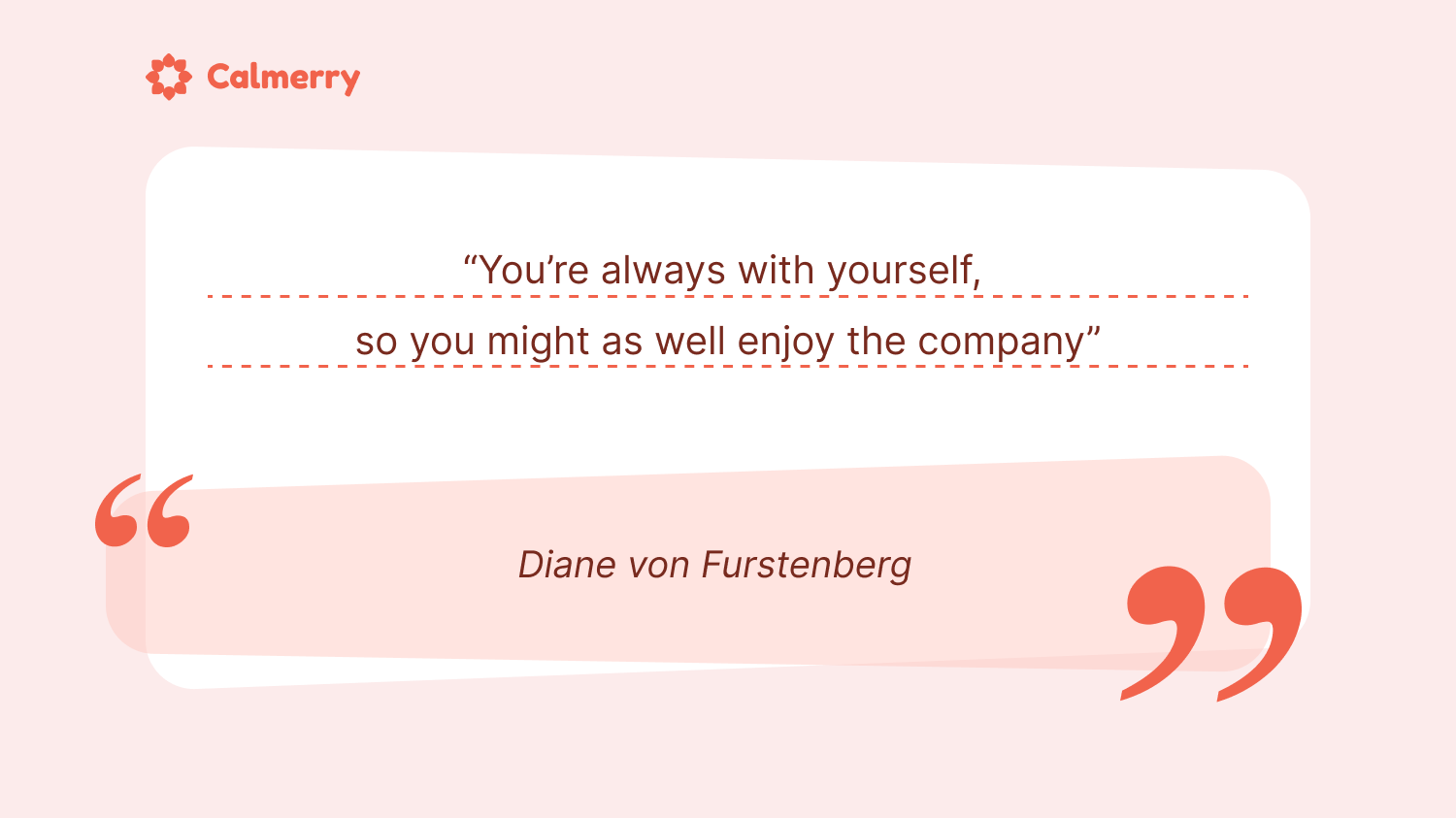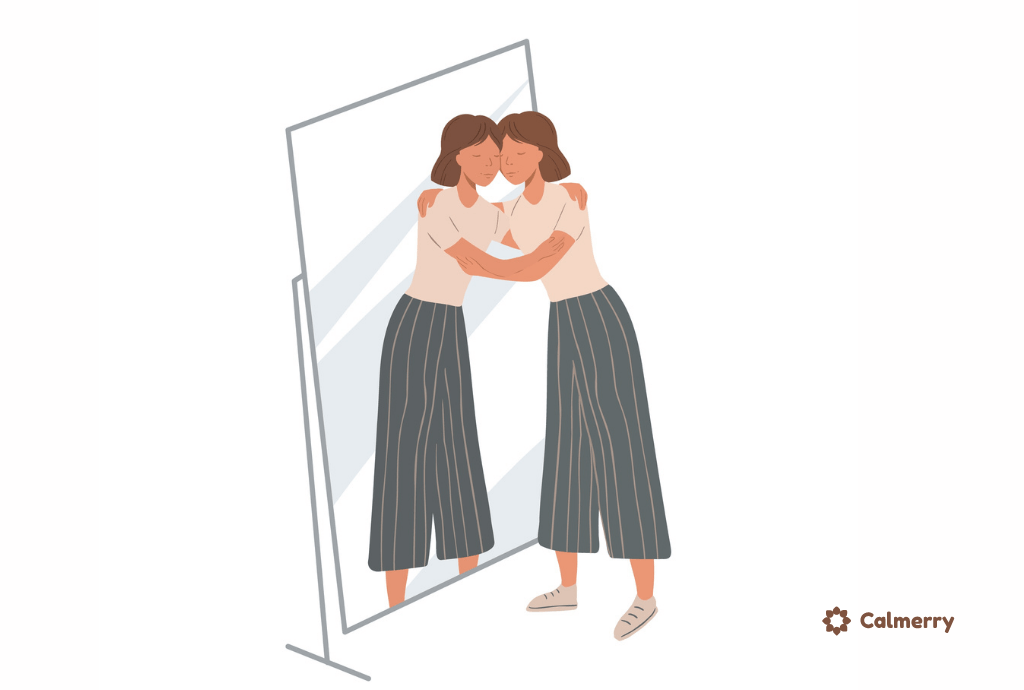You’re My One and Only: 5 Ways to Learn to Love Yourself

In this article
Do you love yourself? You’ve been living with yourself for quite a while, and you’ve done a lot to make your own life better. Still, everyone has a long list of things they wish they’d never done. Failures, not the best decisions, the wrong words said to people – we all have many reasons to be disappointed in ourselves.
Besides, every one of us experiences the pressure of other people’s expectations, whether they are parents, managers, friends, or complete strangers. Some of these expectations might be completely unrealistic.
For instance, the standards of beauty and success portrayed in social media are unattainable for the vast majority of people, so it’s no surprise that so many of us feel like we’re not good enough.
And yet, we need to love ourselves unconditionally because we are our first and most important source of support. You need self-compassion and healthy self-esteem to withstand all the challenges life throws at you. You should realize that mistakes are inevitable, so you also need to nurture self-acceptance, accepting failures as opportunities for learning and growth.
In other words, you need to learn how to love yourself when you don’t know how, which can be as difficult as it sounds. If your self-esteem is low, you may spend years learning yourself and trying to come to terms with yourself.
What self-love is and why it matters
In short, self-love includes all the things you would think of when describing love, in general: compassion, acceptance, support, kindness, validation, and appreciation.
It’s rather an action than just a feeling because self-love is all about practice. And to build self-love, you should first learn to communicate with yourself without judgment and criticism.
Self-love is beneficial for your overall mental well-being, lowering your chances of developing depression and anxiety disorders. It also allows you to better cope with stress and develop a generally more optimistic outlook on life.
Self-love allows you to live a happier life and build healthier relationships with others because you can set boundaries and prioritize your interests and needs when necessary.

Besides, if you want to show love to others, you need to learn to love yourself first. The way you interact with friends and coworkers, the way you raise your children, and even the goals that you set for yourself depend on how much love you give to yourself.
The reason is that your relationship with yourself inevitably impacts your responses to other people’s words and actions, as well.
Why self-love is important
First of all, the lack of self-love leads to increased self-criticism. So, you might start to engage in negative self-talk, make self-deprecating jokes, and criticize yourself and your abilities in many other ways.
Low self-esteem can make you care more about other people’s interests than yours, and you may even engage in self-sabotaging behavior, consciously or subconsciously undermining your own efforts.
Research data shows that a positive attitude toward oneself is one of the key ingredients of happiness and success. It also makes a person more likable. The lack of self-love can set you back in life, even in terms of career. Most people who lack self-love often take the back seat in life and miss out on opportunities because they don’t think they deserve to be successful or happy.
The good news is that if you lack self-love, you can unlearn your old self-sabotaging habits and learn to be kind to yourself.
Below, we will explain how to learn to love yourself and be confident, no matter what. Some simple practices can help you make noticeable changes in your life and self-esteem.
First things first: do you love yourself?
Most people with low self-esteem struggle to notice when they are unfair to themselves. However, there are ways you can tell if you don’t love yourself enough.
If you answer “yes” to any of the following questions, there’s a high chance you struggle with self-love:
- Do you despise your flaws and limitations?
- Do you have a hard time acknowledging or celebrating your accomplishments?
- Is it hard for you to forgive yourself?
- Are you afraid to express your emotions out of fear of hurting others?
- Does taking care of your body and mind seem selfish?
- Do you tend to compromise your needs and people-please?
There are many little details in behavior and thoughts that may indicate low self-esteem and a lack of self-love. To better understand your level of self-esteem, you can take our self-esteem test. If it shows that your level of self-esteem is low, it means that you can benefit from talking to a therapist.
What should you do to learn to love yourself?
If you’ve been struggling with self-love for a long time, don’t give up. It happens. It could take a while before you truly learn to embrace and how to take care of yourself.
The following tips might help you get closer to your goal more quickly and feel more warmth toward yourself.
1. Set healthy boundaries and stick to them
One of the first things you need to do when you’re learning to love yourself is to know your limits and set boundaries. And this isn’t easy to do, but you can learn by improving self-awareness and relying on some of your natural signals.
For example, you can often tell when something doesn’t sit well with you because certain emotions accompany it. When someone crosses your boundaries, you might feel angry, irritated, worried, upset, or hurt.
Start paying attention to these emotions. When do you feel this way? Who makes you feel this way? What boundaries do you need to set to feel more comfortable and safe?
Once you’ve identified your triggers and listed boundaries, the true test for self-love is maintaining these limitations.
Don’t let anyone get away with disrespecting you or crossing your boundaries. Muster up the courage to speak up if it happens and let them know what you need. It may not come easily at first, but the more you do it, the easier it gets. Eventually, you might realize that you love yourself more than you used to.
2. Do what you love
Sometimes loving yourself involves something as simple as doing the things you love. Many people struggle with this, especially in romantic relationships.
Sometimes, people sacrifice everything they love so that they can please their loved ones, and this definitely isn’t a healthy model of relationships. The fear of judgment and other people’s expectations shouldn’t stop you from doing what you love.
So, next time you want to do something for yourself, and you’re afraid of letting someone down or being judged, do it anyway. You’ll notice that there’s nothing horrible about doing it and enjoying your life to the fullest. You’ll feel alive, more true to yourself, and motivated to lead a fulfilling life.
3. Take care of yourself
Some of us spend so much time taking care of others that we forget to take care of ourselves. If that’s your case, you might often feel drained and unmotivated to live your life the way you want. The good news is that you can change the situation by adding yourself to your priority list.
Don’t just go through life taking care of everyone else. Take the time to pamper your number one – yourself! You always deserve it.
Take that vacation you’ve been dreaming about. Schedule that appointment. Go on that romantic date. Take that day off. These may seem like little things, but they go a long way in helping you learn how to love yourself.
4. Learn to say no
“No” is a short word, but it can be a complete sentence. This single word allows you to clearly indicate what you don’t want for yourself and draw your boundaries.
Unfortunately, many people struggle with saying “no.” They don’t want to do it out of fear of hurting someone’s feelings, being vulnerable, or losing a relationship. If you find it difficult to say no, it means that you may put other people’s interests before your own. Moreover, you might often feel resentment toward everyone you can’t say no to – or even toward yourself for each undesired “yes.”
You may hate your boss because they always get you on numerous projects all at once, disregarding your capacity. Or maybe, your spouse gets on your nerves because you can’t say no to their demands, and so on. If you take some time to self-reflect, you’ll likely notice that your life creates more “yes”-opportunities for you when you say “no” to others more often.
So, you’re limiting yourself by being a “yes-person.” Quit doing it. The next time someone has a demanding request you can’t or don’t want to say yes to, just say no – and don’t feel the need to explain. It will take a bit of courage, but it will make you feel so much better!
5. Forgive yourself
Sometimes, we pressure ourselves to be perfect, and it can be easy to forget about self-compassion. If you behave like that, it’s time to take it easy. There will be times when you mess up, and that’s okay. Forgive yourself and learn from it.
You should also set realistic goals to avoid feeling like you’re disappointing yourself. You’ll find that life is easier, you save more resources, and you can handle most challenges that you face. Above all, try to forgive yourself for the mistakes you’ve made, even if they seem unforgivable.
Bonus (and life-changing) tip: Seek professional help
If you’ve tried to cultivate self-love and you’re still struggling with your self-esteem, it may be time to seek professional help.
You don’t have to see a therapist when you’re going through heavy stuff only. Talk therapy can help you figure out what stops you from embracing yourself and provide you with valuable insights when it comes to learning how to love yourself.
A licensed therapist can also suggest effective self-care practices, so you can learn how to build a caring relationship with yourself, practice self-compassion, and nurture healthy self-esteem.
So, start the journey of self-love today and get matched with a licensed mental health professional from your state within an hour on Calmerry. It’s a journey you definitely won’t regret.
online therapy
live video session





